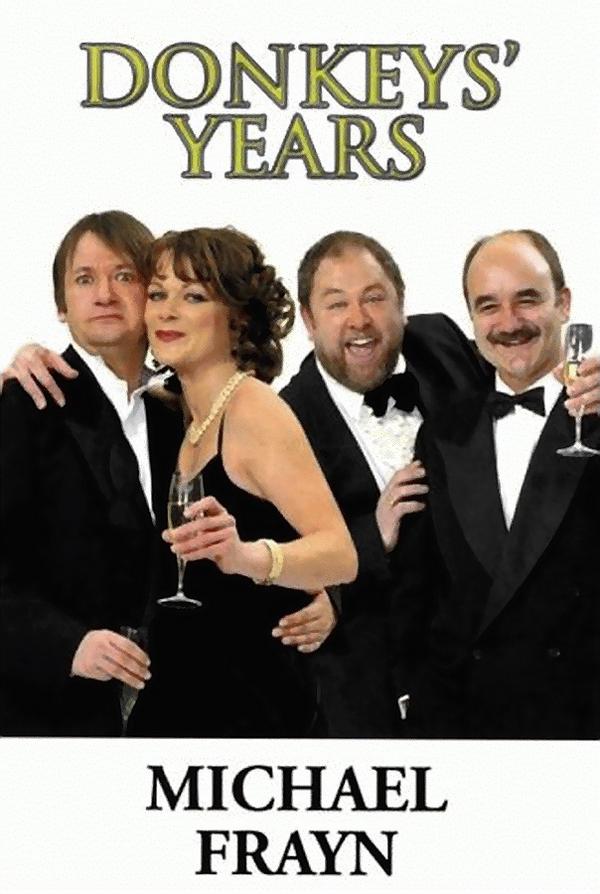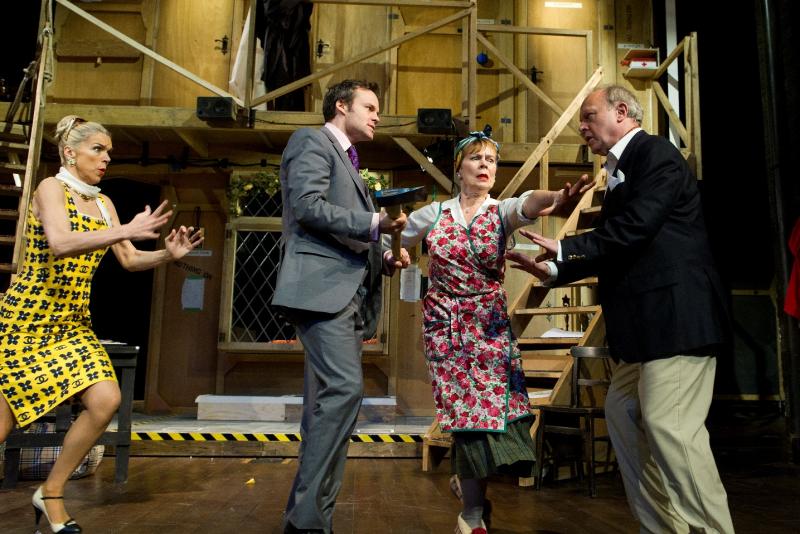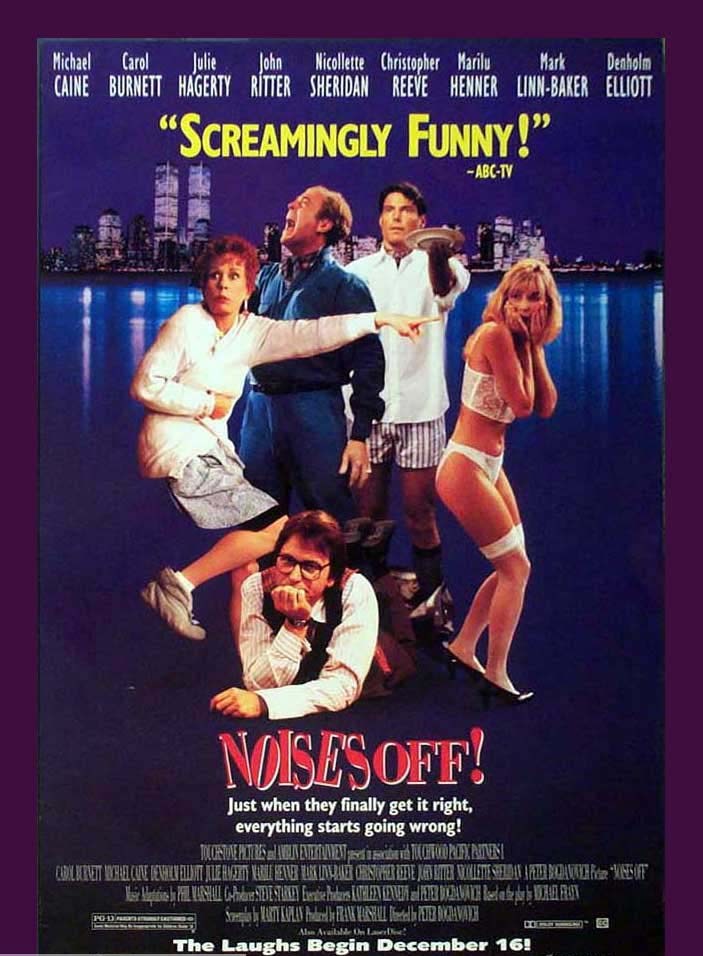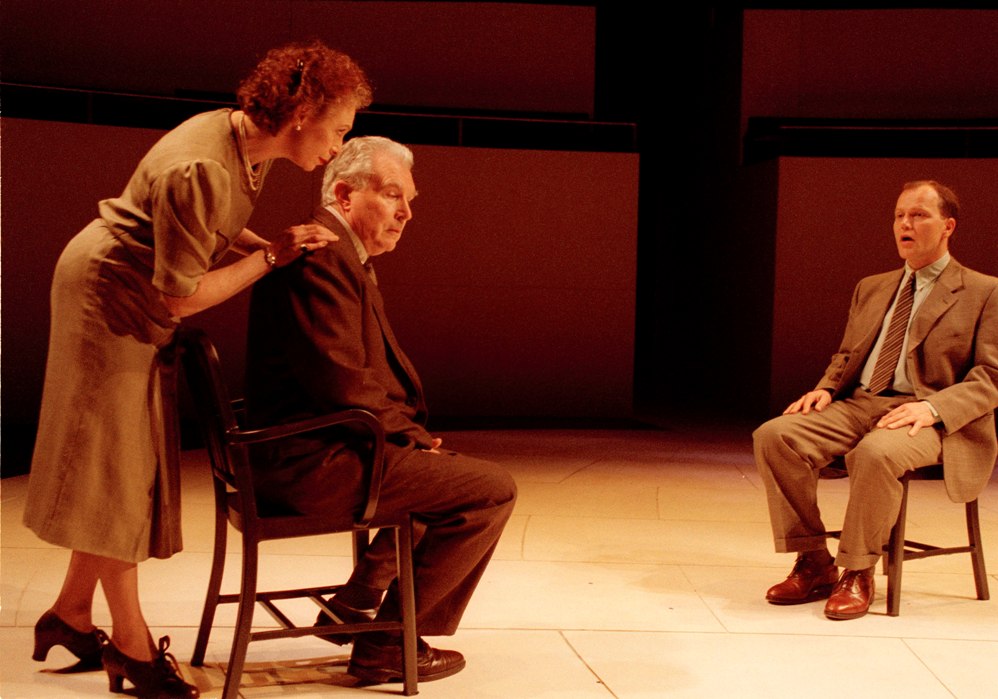theartsdesk Q&A: Writer Michael Frayn | reviews, news & interviews
theartsdesk Q&A: Writer Michael Frayn
theartsdesk Q&A: Writer Michael Frayn
The laureate of chaos on the seduction of order in disorder
Michael Frayn (b 1933) has been having an annus mirabilis. The play the hapless actors of Noises Off are touring is called Nothing On. In the playwright’s case, almost everything has been on. Frayn’s best-known farce spent the first half of the year tickling ribs at the Old Vic and then in the West End.
Meanwhile, his new novel Skios is splitting sides. A what-if farce set in an over-endowed academic foundation on the shores of the Aegean, it was longlisted for the Man Booker Prize but didn’t make the recently announced shortlist. The idea is Fraynian to its fingertips, a brilliantly plotted turn which asks for only the mildest suspension of disbelief. A floppy-fringed well-spoken wastrel called Oliver Fox lands an Aegean airport for a dirty week in the sun with a woman he barely knows, only to be seduced by the look of another woman waiting at the barrier whom he doesn't know at all. No matter that she’s holding up a card which doesn’t bear his name but that of a Dr Norman Wilfred.
 Is it any wonder Frayn is having a good year? Who else could be relied upon to have a Greek comedy and a German tragedy making calls upon the public attention just as those two cultures wrestle over all our futures? The laureate of chaos, whose plots finds structure in disorder, is a man (accidentally) of the moment. A glance down the long list of his plays and novels suggests an author whose mind is perpetually in a state of productive division. On the one hand he writes fancy-free, riotous farces - see also the college reunion caper Donkey's Years (1976). On the other he can produce a dramatic disquisition on the relationship between the two Germanies or, in the case of Copenhagen (1998), nuclear physics. He has also beautifully translated the major Chekhov plays.
Is it any wonder Frayn is having a good year? Who else could be relied upon to have a Greek comedy and a German tragedy making calls upon the public attention just as those two cultures wrestle over all our futures? The laureate of chaos, whose plots finds structure in disorder, is a man (accidentally) of the moment. A glance down the long list of his plays and novels suggests an author whose mind is perpetually in a state of productive division. On the one hand he writes fancy-free, riotous farces - see also the college reunion caper Donkey's Years (1976). On the other he can produce a dramatic disquisition on the relationship between the two Germanies or, in the case of Copenhagen (1998), nuclear physics. He has also beautifully translated the major Chekhov plays.
The nice thing about writing fiction is you don’t have to think about yourself
Not that there’s no structure at all to his commutes between thematic hemispheres. He has also done both a novel – Toward the End of Morning (1967) – and a play – Alphabetical Order (1975) – which evoke the inky smell of hot metal from his early days on Fleet Street. Skios echoes the lecture-gone-wrong plot of his screenplay for Clockwise (1986). It should be said that not every year is Frayn’s year. There have been plays – rather more than with other writers – which have not hit the spot, among them not only Here (1993) but also Look, Look (1990), and Afterlife (2008), his most recent play about the Austrian actor/director Max Reinhardt.
Parked on a sofa in the offices of Faber & Faber, he’s all cranium,limbs and contentment as he talks to theartsdesk about his long and fruitful relationship with chaos.
JASPER REES: Does it sometimes occur to you that it’s a strange thing to produce two such diametrically different works as Democracy and Skios? How do they emerge from the same brain?
MICHAEL FRAYN: Well, I‘m not the first writer who’s written some comedies and some serious things. It has been know before. Some things in life seem to me on the whole funny and some things seem to me on the whole serious and some things disconcertingly very often seem to be a mixture of the two. So it seems quite natural sometimes to write comedies and sometimes serious plays and sometimes things that do indeed like life mix both of them.
 What made you alight on the idea of a ridiculous intellectual foundation and put the wrong people in there?
What made you alight on the idea of a ridiculous intellectual foundation and put the wrong people in there?
Well, every time I’ve ever arrived at an airport somewhere – and I’m sure I can’t be the only person who’s thought this - and seen a line of people holding up names, I’ve always thought, what if? One’s plainly got the advantage. They plainly don’t know what one looks like. If they didn’t they wouldn’t hold up a card, they’d just come up and say, “Mr Frayn, your car is awaiting.” What would happen if you went up to someone holding up another name altogether and said, “I’m so and so?” How far would you get? Well, I haven’t got the courage to do it myself but the nice thing about writing fiction is you’ve got a lot of assistants who are braver than I am and are prepared to shoot spies or climb mountains or whatnot or do something ridiculous like that. People have said it’s yet another plot about mistaken identity, which is true, but it’s rather extreme case of mistaken identity. Lots of people have pretended to be people they aren’t for profit or because they’re spies or just out of cussedness but usually they have got some idea of who they are trying to pass themselves off as. But when Oliver Fox sees the name “Dr Norman Wilfred” held up, he hasn’t the faintest idea what sort of a person Dr Norman Wilfred is so he’s got to find out from the reactions of people around him who he is in order to pretend to be that person.

Pictured above: Janie Dee, Jamie Glover, Celia Imrie and Jonathan Coy in Noises Off at the Old Vic. Photograph by Tristram Kenton
At the same time he has no personality of his own.
This is again an extreme case of what everyone does. Everyone tries to suss out what’s expected of them from other people and unless they are completely psychopathic they will attempt to present some kind of version of that person. Or some compromise between the person they are expected to be and the person they think they are themselves.
Which leads me neatly on to the question: who are you expected to be and are you that person?
The nice thing about writing fiction is you don’t have to think about yourself. You think about your characters. I suppose writers are expected to come on as themselves. They are expected to do interviews like this or go to literary festivals and talk about how they thought of their ideas when really they haven’t the faintest idea. And be literary personae.
Is it a comfortable fit? Have you grown or shrunk into the role?
I’ve grown or shrunk into the role to an extent over the years. I used to find I didn't fit at all but if you go turning up at literary festivals and talking about your work eventually it comes to seem slightly more natural.
Why did you not fit?
When I did English in the sixth form at school the masters began the course by saying, “This course is not for those boys who do not get on with books,” and I knew he meant me because I don't really get on with books. I’m not really a literary person. I read rather slowly. I don’t read very intelligently. I can’t remember what I’ve read. And I just have read all the stuff that other people have read.
Do you feel when you move in literary circles that feels you’re bottom of the class?
I feel like an outsider, yes. A bit of an outsider, a bit of an Oliver Fox trying to pass myself off as a literary mind. It was the same at university. I started off by reading French and Russian but I had to give up because I absolutely loved the language of it, loved translating, loved attempting to write French and Russian, but part two of the Cambridge tripos was going to be all literature and I could not find, could not discover what they wanted me to write about these books. I tried everything. I tried saying what standard authorities had said about the books. I tried to say what I’d thought about them, I tried a discreet mixture of the two. None of it seemed to work, so I switched to philosophy and found that much more congenial.
Why was it congenial? Someone brilliantly said in the Guardian recently that “philosophy is just stating the bleeding obvious with extra jazz hands”.
Absolutely. I think good philosophy isn’t saying what everyone knows. Some sort of view like that used to be the standard view of English philosophy. People have rather backtracked from that now. But I think there’s a lot to be said for seeing philosophy as trying to express what everyone knows to be the case and not what they’ve been persuaded to believe to be the case.
Is one of the challenges of farce working out how to end it?
It certainly was in Noises Off. I think it’s a probable with any plotted entertainment, isn’t it? That what keeps the thing going is the fact that the plot has not been resolved and we want to know whether they’re going to find the perpetrator of the crime and once the plot is resolved it’s extremely difficult to go on any further and it’s very difficult to stop just at the moment the plot is resolved. It was a particular difficulty in Noises Off, I have to say, for another reason, because when I wrote the play it was original two and a half acts of farce and then half an act of serious existential drama. And when we previewed it at Lyric Hammersmith it became very evident that the audience didn’t wish to see an existential drama at that point in the evening and it just died completely. So I had to rewrite the last act and find some other way of resolving it. So I set myself an additional problem in that play just by stupidity in the conception of it. I’ve gone on rewriting and rewriting the end of it until it kind of more or less works.
 Does it effectively not have an end? Are they like sitcom characters locked in eternal stasis?
Does it effectively not have an end? Are they like sitcom characters locked in eternal stasis?
I suppose so, yeah. They made a film version of it. Peter Bogdanovich did it for Disney and he explained to me that it’s part of the aesthetic of American cinema that things have to be resolved at the end, that the play (transferred to an American setting) which was subject to disaster on the road has gone on to Broadway and been a hit, that the relations of all the characters are resolved and couples that weren’t supposed to be together are together once again and that we learn a lesson that while we were fighting on the road we had a failure on our hands but once we got together we had a hit on Broadway.
How did that make you feel?
Fortunately I was not writing the screenplay. I said, “It’s going to be difficult to do because my play ends the company have made a total hash-up of the play.” So somebody else wrote the screenplay. I got a message from Peter Bogdanovich saying they had shot the film and they were doing try-outs in the San Fernando Valley and everything was going fine up to about 10 minutes before the end when the audience were leaving. Could I rewrite the end for them? I didn’t want to go all the way to Los Angeles but if they sent the film to New York I would go to New York and see it. I saw why they had got a problem: in the last 10 minutes they were trying to do all this. He could only get two more days’ shooting but I said I would try to reshape the beginning and the end so that the end didn't come out of nowhere so the end could be much shorter and we could have this triumph on Broadway come out of left field slightly more convincingly. That’s what I did and still didn't really make the film work.
 Pictured above: Copenhagen at the National Theatre: Sara Kestelman, David Burke and Matthew Marsh photographed by Geraint Lewis
Pictured above: Copenhagen at the National Theatre: Sara Kestelman, David Burke and Matthew Marsh photographed by Geraint Lewis
How about the ending for Skios? You’re driving all these characters to this final focal point.
I would say that naturalism is not the mode in Skios. It’s plainly part of the stylisation of the story that all the plotlines come together and that this complicated event has a complicated resolution.
There are two characters in the book who suggest that you don’t have a high opinion of academics. Have your dealings with academe fed into the characterisation of Dr Norman Wilfred and the reclusive German director who runs the foundation from his bed?
Norman Wilfred is a purely fictitious character. There might be a touch of revenge in the case of the German director of the institute for some of the theatre directors I’ve dealt with in Germany. Much as I like Germany and I really do like Germany, I do have a problem with theatre dominated by the director where the director will do anything to destroy the sense of the text of the play. The first production of Copenhagen in Germany, I was very keen that it should be good. It’s about a great German physicist among other things. It was done as a circus performance in which Heisenberg literally turned four back somersaults. I don’t mean metaphorically. He did four back somersaults in the course of the play.
That would narrow down the casting.
And they gave Margretha [the wife of Niels Boehr] a typewriter and any time the other two began to go on rather boringly about physics or politics she would hammer on the typewriter so you couldn’t hear what they were saying.
What did you say to this director?
It was a very difficult situation because they were going to tour this play around Germany which they don't do with many plays and I went to the very first performance in a small town outside Bremen. My German agent came and the plan was to see the show and have dinner with the director and the cast afterwards. And in the interval I went to my agent and said, “I’m terribly sorry, can you find somewhere else to have dinner because I don’t think I can face them?” He went and did a lot of phoning and came back and said, “It’s a very small town. Either we have dinner with the cast or we don’t have dinner.” So I compromised and had dinner with them and said, “Wonderful, wonderful,” and next morning I had breakfast with the director and told him what I actually thought. But they were an extremely nice lot and they were all working very hard and were being very sincere. It was just complete bollocks.
How did the director take it over breakfast?
He was not very concerned about my criticism. I think he probably had met quite a lot of other authors who had said, “Why have you set it in a concentration camp or why are they all dressed as rats or whatever?” It’s the kind of idiot thing that idiot authors say about your wonderful production. I don’t think it bothered him very much.
Are you eager when you sit down to make sure that you never repeat yourself?
I can’t say I’ve thought about it in advance. Just a story comes and seems to develop and take over one’s imagination and I write it. But I’m often aware after I’ve done it that I have plagiarised myself. I realised belatedly with Skios that to some extent I’m plagiarising a film I wrote a long time ago called Clockwise. Also it didn't occur to me until people pointed it out that Copenhagen to some extent plagiarises Noises Off. In both plays you see the same thing three times. In Noises Off you see the same acts of the farce and in Copenhagen you see the same attempt to reconstruct a conversation three times over.
Watch the trailer for Clockwise
I hardly thing that’s plagiarising. That’s merely fondness for structural forms.
I entirely agree. But it is disconcerting when you only realise after the event that you hadn’t seen this when you were planning it and thinking about it so hard. I don’t think I’ve got a three-act structure in Skios. No doubt some PhD student somewhere is doing to detect a three-act structure.
Or when someone turns it into the movie.
That’s the weird thing about movies is they’re supposed in the three-act structure and we haven’t had three-act plays since Noises Off. No one writes three-act plays nowadays and indeed you can’t put them on in the theatre. When we do Noises Off these days I‘ve had to rewrite it to make sure it’s a two-act play. It’s very difficult to get the audience to go out for a second interval now. Chekhov is rather convenient because he writes four-act plays and that divides rather neatly into two acts before the interval and two acts afterwards. What I’ve discovered from translating Chekhov is that those last four plays are all plot, plot, plot. They seem to be about people coming and going and saying hello and then wandering off again but every line is driving forward the business of the play. That’s why they work so well and are done over and over again.
Are you a fluent Russian speaker?
I was a Russian speaker. I was trained as an interpreter on National Service. I can still read Russian fluently but I can’t really speak it fluently.
Some people adapt from a literal translation. Presumably not you.
I find it hard enough to do it from the Russian but to do it from somebody else’s translation is absolutely impossible. This is how I got into it translation because the National Theatre asked me to translate some Goldoni and I was very keen to work for the National Theatre. I said, “The trouble is I’ve only got tourist Italian, certainly not enough to translate Goldoni.” They said, “Good heavens, you don’t have to speak Italian to translate Goldoni. We just get a lot of standard translations; you take them home and hash your version together.” I was very keen to do it. I simply could not feel what the original was like. I could not construct it. So I said, “Why don't you ask me to translate something I can actually read like Russian?” They were rather taken with this.
Which was the first play you translated?
The first one I did was Tolstoy play called The Fruits of Enlightenment. Not a very good play. Tolstoy is not really a playwright. He doesn’t think that way. Then the next thing I did was The Cherry Orchard. Also done by the National. Wrong play to start with because it’s the last chronologically, because it’s the hardest to do, the hardest to direct, the hardest to act.
There have been some plays which haven’t been welcomed with open arms.
Oh absolutely. Yes I have half and half plays that have done reasonably well and plays that have not done at all well.
No one knows anything about how plays and films and books are going to be received
Do you understand why it happens?
I sometimes do. My worst flop was a play called Look, Look. I think I see what was wrong with that. And I certainly wouldn’t defend it. That’s gone. Paul Taylor’s review [in the Independent]said the plot of Act 2 would have fazed Wittgenstein. Anything would have fazed Wittgenstein. He was professionally committed to not understanding anything about what was going on around him. But I had a play called Here which was originally done at the Donmar which has just been revived in a very rewritten version at the Rose in Kingston and the reviews were extremely good for the production and the cast but mostly lukewarm sometimes worse, for the play itself.
Are they wrong?
I still feel absolutely committed to that play. I think it’s my best play. I’m cast down that I can’t persuade other people of this. It got some good reviews and audiences seemed to be strongly in favour.
Why is it your best play?
I think it has truth in it. It’s done extremely simply. It’s serious and has some comedy in it. And if we didn't manage to convince them with this absolutely wonderful cast perhaps we never will.
So you’re aware the odds on success aren’t particularly great.
Acutely aware. Everyone in the theatre realises that it’s a high-risk enterprise. And no one can predict public taste. No one knows which way people are going to jump. No one knows anything about how plays and films and books are going to be received. You just know you’re likely to get a surprise.
Do you have anxiety about it in advance?
Yeah sure, of course. You sit there on first nights and indeed in previews feeling extremely anxious.
Same with novels?
Yes. It’s less immediate because you don’t have to watch people reading the novel. They can be chucking it away half read all over Britain without your being aware of it. Whereas if you’re sitting in a theatre with an audience not liking something it’s a very immediately painful experience, much worse for the actors. Which is why I think as a writer one has a certain obligation to turn up on first nights. Not all writers feel this but I think one should. It’s much worse for the cast. If you have a flop at any rate the author can stay away. The cast have got to go and stand there in front of the audience who have read bad reviews and know the play is not liked and do it again and do it again until the producer takes it off.
Noises Off is this extraordinary indestructible play about chaos. Is there a part of you that wants to say to the world, actually I did write some other things?
I mean it’s better to be known for one thing than nothing, but better still to be known for two things than one thing, I suppose, and so on. It’s true that Noises Off has been by far my most successful thing.
How many limbs has the play been responsible for twisting or breaking?
I don’t know. It’s the thing that worries me. A lot factors have bruised themselves or worse during this play. The first day’s rehearsal at the Old Vic the author gives a little talk to the company. I had just three words: "health and safety".
Explore topics
Share this article
more Theatre
 An Actor Convalescing in Devon, Hampstead Theatre review - old school actor tells old school stories
Fact emerges skilfully repackaged as fiction in an affecting solo show by Richard Nelson
An Actor Convalescing in Devon, Hampstead Theatre review - old school actor tells old school stories
Fact emerges skilfully repackaged as fiction in an affecting solo show by Richard Nelson
 The Comeuppance, Almeida Theatre review - remembering high-school high jinks
Latest from American penman Branden Jacobs-Jenkins is less than the sum of its parts
The Comeuppance, Almeida Theatre review - remembering high-school high jinks
Latest from American penman Branden Jacobs-Jenkins is less than the sum of its parts
 Richard, My Richard, Theatre Royal Bury St Edmund's review - too much history, not enough drama
Philippa Gregory’s first play tries to exonerate Richard III, with mixed results
Richard, My Richard, Theatre Royal Bury St Edmund's review - too much history, not enough drama
Philippa Gregory’s first play tries to exonerate Richard III, with mixed results
 Player Kings, Noel Coward Theatre review - inventive showcase for a peerless theatrical knight
Ian McKellen's Falstaff thrives in Robert Icke's entertaining remix of the Henry IV plays
Player Kings, Noel Coward Theatre review - inventive showcase for a peerless theatrical knight
Ian McKellen's Falstaff thrives in Robert Icke's entertaining remix of the Henry IV plays
 Cassie and the Lights, Southwark Playhouse review - powerful, affecting, beautifully acted tale of three sisters in care
Heart-rending chronicle of difficult, damaged lives that refuses to provide glib answers
Cassie and the Lights, Southwark Playhouse review - powerful, affecting, beautifully acted tale of three sisters in care
Heart-rending chronicle of difficult, damaged lives that refuses to provide glib answers
 Gunter, Royal Court review - jolly tale of witchcraft and misogyny
A five-women team spell out a feminist message with humour and strong singing
Gunter, Royal Court review - jolly tale of witchcraft and misogyny
A five-women team spell out a feminist message with humour and strong singing
 First Person: actor Paul Jesson on survival, strength, and the healing potential of art
Olivier Award-winner explains how Richard Nelson came to write a solo play for him
First Person: actor Paul Jesson on survival, strength, and the healing potential of art
Olivier Award-winner explains how Richard Nelson came to write a solo play for him
 Underdog: the Other, Other Brontë, National Theatre review - enjoyably comic if caricatured sibling rivalry
Gemma Whelan discovers a mean streak under Charlotte's respectable bonnet
Underdog: the Other, Other Brontë, National Theatre review - enjoyably comic if caricatured sibling rivalry
Gemma Whelan discovers a mean streak under Charlotte's respectable bonnet
 Long Day's Journey Into Night, Wyndham's Theatre review - O'Neill masterwork is once again driven by its Mary
Patricia Clarkson powers the latest iteration of this great, grievous American drama
Long Day's Journey Into Night, Wyndham's Theatre review - O'Neill masterwork is once again driven by its Mary
Patricia Clarkson powers the latest iteration of this great, grievous American drama
 Opening Night, Gielgud Theatre review - brave, yes, but also misguided and bizarre
Sheridan Smith gives it her all against near-impossible odds
Opening Night, Gielgud Theatre review - brave, yes, but also misguided and bizarre
Sheridan Smith gives it her all against near-impossible odds
 The Divine Mrs S, Hampstead Theatre review - Rachael Stirling shines in hit-and-miss comedy
Awkward mix of knockabout laughs, heartfelt tribute and feminist messaging never quite settles
The Divine Mrs S, Hampstead Theatre review - Rachael Stirling shines in hit-and-miss comedy
Awkward mix of knockabout laughs, heartfelt tribute and feminist messaging never quite settles
 Power of Sail, Menier Chocolate Factory review - alternately stiff and startling
Paul Grellong play delivers in its final passages
Power of Sail, Menier Chocolate Factory review - alternately stiff and startling
Paul Grellong play delivers in its final passages

Add comment